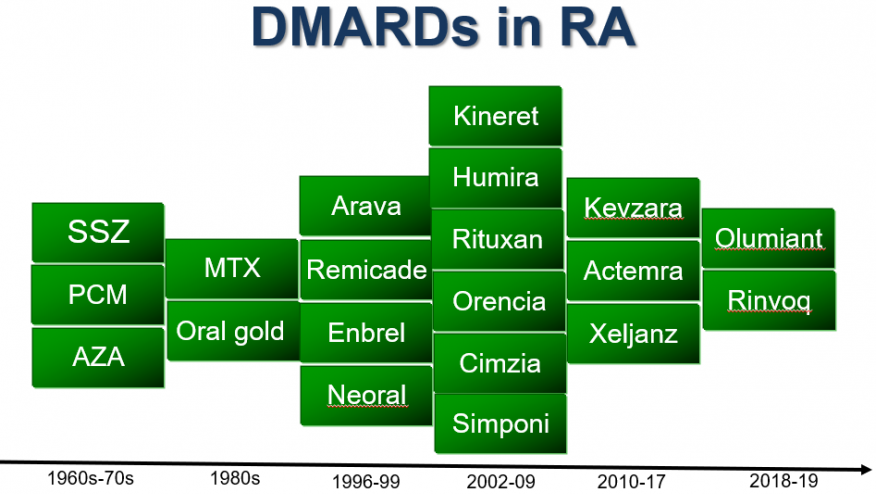Rheums Speak - RA Treatment Survey Save

Be sure to take today's new Survey on Changing Rheumatology Practice & Choices!!
RheumNow's August 2025 “Live Vote” surveys examine Rheumatologist impressions, knowledge and practices over the last 20 years when treating rheumatoid arthritis.
The first survey on RA Treatment (7/28/2025) sheds light on evolving prescribing habits, use of biologics, and key frustrations in RA care.
From a single email invite (and social medial prompt) a total of 458 responses were collected from US and non-US Rheumatologists, fellows and advanced practice providers dedicated to rheumatology. Worldwides responses included 195 (43%) from US and 228 (57%) from outside the US (from 34 countries). Respondents were mostly male (62%), with most (45%) practicing for more than 20 years.
Worldwide results are shown (US results shown in parentheses).
Key Findings from the RA Treatment Survey
- Biologics tend to dominate therapeutic choices and may have been the most transformative advancement
- 59% of respondents identified biologic agents as the greatest advancement in RA care in the last 20 years - even higher in US Rheums (72%). Fewer viewed the greatest advance in the last 20 years to be methotrexate 33% (23% in the US) or JAK inhibitors 6% (2% in the US).
- Earlier Use of Biologics has become the Norm
- A majority (57%) reported using biologics earlier than they did 20 years ago, reflecting a major shift in treatment philosophy. Nearly 20% indicated their confidence in biologics by knowing how and when to use these agents safely; and 6-9% indicated that all patients are on biologics or newer agents.
- Over the last 20 years they are using MORE:
- TNF inhibitors 43% (US 53%)
- JAK inhibitors 21% (US - 24%)
- Methotrexate 25% (US - 3%)
- IL-6 inhibitors 5% (US - 9%)
- Over the last 20 years they are using LESS:
- Hydroxychloroquine 46% (US - 55%)
- B cell inhibitors 14% (US - 18%)
- T cell costimulation 25% (US - 9%)
- Biologic choices have matured
- Most clinicians are pivoting after a TNF inhibitor failure, with the majority switching to another mechanism of action (MOA) agent after either One 50% (US 40%) or Two 45% (US 59%) TNF Inhibitors.
- Only 3-5% of rheumatologists use other MOA biologics first.
- After failing at least 1 biologic (e.g., TNFi), more are likely to choose another MOA drug (44%), as opposed to choice guided by insurance 19% US 33%), efficacy data 14% (12%) or safety concerns 12% (US 8%).
- Most clinicians are pivoting after a TNF inhibitor failure, with the majority switching to another mechanism of action (MOA) agent after either One 50% (US 40%) or Two 45% (US 59%) TNF Inhibitors.
- Strong Expectations for Early Treatment Response with Biologics
- Over 90% of respondents expect to see a clinical response to biologics within 3 months, with nearly 30% expecting improvement within 6 weeks—highlighting a sense of urgency with biologic treatments.
- Hydroxychloroquine Use Has Declined Significantly
- 46-55% of rheumatologists reported using less hydroxychloroquine over the past 20 years— the most significant decline among DMARDs.
- Treatment Decisions in RA Care - Favors Swollen Joints Over Labs
- The need for aggressive newer therapies is most influenced by the number of swollen joints, >39%, followed by radiographic erosions 31% and functional disability 18%. By contrast, only 8-12% indicate labs (seropositivity,ESR, CRP) influence aggressive prescribing.
- Many Disappointments in RA Care
- Rheums were equally split in what is most disappointing about RA care:
- Lack of predictive biomarkers 26% (US - 23%)
- Cost of care 22% (US - 32%)
- Unpredictable DMARD responses 21% (US - 22%)
- Untimely referral 16% (US - 10%)
- Overuse of steroids 15% (US - 14%)
- Rheums were equally split in what is most disappointing about RA care:
Based on these findings, respondents suggest several needs in RA Treatment:
- There is a need for more guidance on the earlier and targeted use of biologics, particularly non-TNF MOAs.
- There is a desire for predictive biomarkers to guide treatment selection.
- The use of biosimilars is a minority (5-9%) among prescribers.
This series of surveys was sponsored by Bristol Myers Squibb and will conclude with a Tuesday Nite Rheumatology Webinar, on August 26, 2025.










If you are a health practitioner, you may Login/Register to comment.
Due to the nature of these comment forums, only health practitioners are allowed to comment at this time.